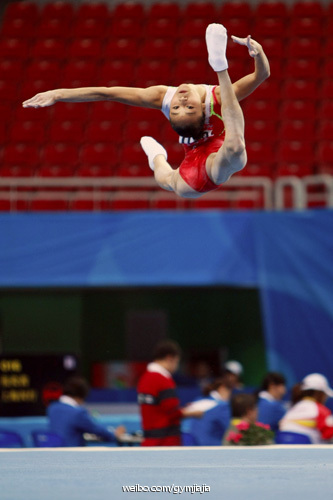

He, the Olympic uneven bars champion at Beijing 2008 and possessor of the most technically challenging routine in the world, fell spectacularly from the bars minutes earlier - as did her young team-mate, Huang Qiushuang. The tiny 18-year-old, barely the 4ft 9in listed in her profile, is cloistered by two-dozen Chinese reporters in a large, rectangular basement a stone's throw from the main arena at the World Gymnastics in Rotterdam.

So here’s hoping we can exchange this unfortunate status quo for a new rule: “If you can’t beat them, do better.He Kexin can barely speak through the sobbing. Because when we look at the odds that must be overcome for a Simone Biles to become a legendary gymnast or for a Rich Paul to become a successful sports agent, their degree of difficulty is already at its maximum. Instead of changing the rules to limit excellence, what if our knee-jerk reaction to excellence, merit, and achievement was to exhibit more excellence, show greater levels of merit, and accelerate achievement? This would be a notable difference from our status quo where we root for the underdog but sabotage the underdog’s success. Even a successful African hair braider in Utah ended up fighting against her state cosmetology board to unsuccessfully argue that she should not be forced to cosmetology school (which does not include classes on African hair braiding) to continue her thriving business. And in Los Angeles where street vending has been decriminalized, food trucks are now fighting against unlicensed street vendors using similar logic. Restaurant owners across the country push for laws to limit competition from food trucks. Almond milk and soy milk companies continue to fight for the right to call their increasingly popular plant-based products “milk” because of lawsuits from dairy farmers. In business, the urge to stifle competition by changing the rules is oddly ubiquitous despite the common rallying cry for free-market capitalism. Anything to protect the integrity of our elections, right?

Unsurprisingly, as nonwhites have grown to represent one third of the electorate, jurisdictions previously subject to preclearance have purged their voting rolls at a rate 40 percent higher than jurisdictions without this history of discrimination. In politics, jurisdictions with a history of racial discrimination were required to seek preclearance for changes to their elections law until th e Supreme Court overturned this requirement in in 2013. The “if you can’t beat them, change the rules” mantra is not limited to sports. And anyone without a college degree can’t be trusted, right? Because college athletes need to be protected from unscrupulous actors. This rule was later rescinded after observers dubbed it the “ Rich Paul Rule” because Paul obtained his tremendous success despite not earning a bachelor’s degree. This did not stop the NCAA from creating a certification process for agents that required them to have a bachelor’s degree. Rich Paul, agent to National Basketball Association superstars like LeBron James and Anthony Davis negotiated over $625 million in contract deals.


 0 kommentar(er)
0 kommentar(er)
